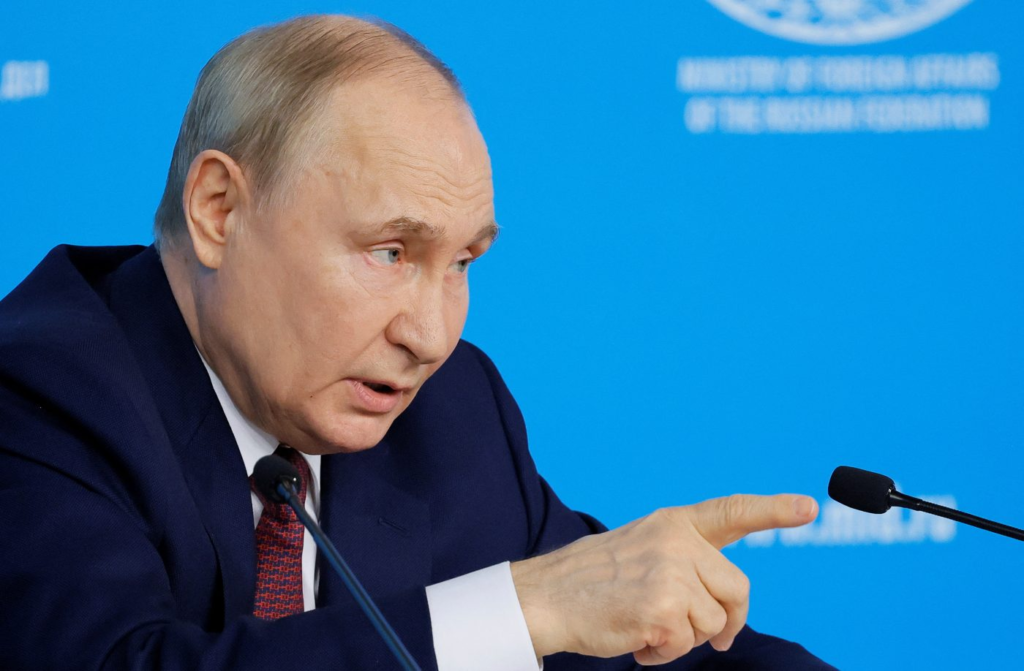As the world reels from a wave of military escalations, Russian President Vladimir Putin has announced a significant increase in the production of hypersonic missiles, raising global concerns about the risk of a full-scale World War III.
The announcement comes in the wake of a dramatic turn in the Middle East conflict, triggered by President Donald Trump’s surprise airstrikes on Iran’s nuclear infrastructure. The U.S. President hailed the strikes as a “very successful attack,” a move that has further destabilized an already volatile region. The targeted airstrikes reportedly involved the deployment of six “bunker buster” bombs, striking key nuclear sites in Iran, including Fordow, Natanz, and Isfahan.
In response, high-ranking Iranian officials were reported to have met with Vladimir Putin in Moscow before launching retaliatory attacks on U.S. military bases in the Middle East, including Al Udeid Air Base in Qatar. The situation has prompted widespread fear of a regional war spilling into a broader international conflict.
Russia Responds With Military Build-Up
Now, with tensions running high, Russia is taking proactive steps to reinforce its military readiness. In a nationally televised press conference, Putin confirmed that Russia is ramping up production of the advanced Oreshnik hypersonic missile systems.
“Serial production of the latest Oreshnik medium-range missile system is under way,” Putin announced, adding that the weapon had “proven itself very well in combat conditions.” The Oreshnik missiles—also known as Hazel tree missiles—were first used during a Russian offensive in Ukraine in November 2024.
The missiles, believed to have an intermediate range of up to 5,500 kilometers (3,415 miles), are capable of reaching virtually any target in Europe or even the western United States. Putin had previously boasted that the Oreshnik is “impossible to intercept” and possesses destructive power comparable to that of nuclear weapons.
Contested Capabilities and Western Concerns
While Russia claims these missiles are a strategic game-changer, Western military analysts have expressed skepticism. A senior U.S. defense official downplayed the significance of the Oreshnik, calling it “experimental” and suggesting that the Kremlin may be exaggerating its capabilities to project strength amid dwindling resources.
Read Also:
UK on high alert as Iran threatens retaliation following US strikes
UK on high alert as Iran threatens retaliation following US strikes
Trump downplays Iran’s retaliation, while UK warns of escalation, WW3 risk
Despite these doubts, the Kremlin has announced plans to deploy Oreshnik missile systems to Belarus—Russia’s close ally—which borders several NATO countries, including Poland, Latvia, and Lithuania. The move could pose a direct threat to the security architecture of Eastern Europe.
The developments are being watched closely by global powers. Sir Keir Starmer, the UK Prime Minister, has issued a stark warning about the risk of escalation following Trump’s airstrikes. Speaking from Chequers, he stated: “That’s a risk to the region. It’s a risk beyond the region, and that’s why all our focus has been on de-escalating and getting people back around the table to negotiate what is a very real threat in relation to the nuclear programme.”
Trump, while praising Iran for giving prior notice before their retaliatory missile strike on U.S. bases, called the Iranian response “very weak.” He appeared to soften his stance with a surprising turn toward diplomacy, stating: “Perhaps Iran can proceed to peace and harmony in the region. And I will enthusiastically encourage Israel to do the same.”
Nevertheless, the conflict’s trajectory remains uncertain, with international observers warning that one misstep could ignite a global confrontation.
Stay with New Daily Prime for real-time updates and expert analysis as this story unfolds.



